Making the Most out of Google as a Research Tool (Part 1 of 2)
It’s amazing how much new stuff Google has come up with since 2004, when my article series “Unlocking Google’s Hidden Potential as a Research Tool” appeared here. If you’re feeling like you just can’t keep up with those ubergeeks at the Googleplex, you’re not alone. This two-part article series should do the job of bringing you up to speed on Google’s latest-and-greatest inventions and innovations.
Google’s index has grown from 6 billion documents to well over 8 billion documents. Google Images has grown from 880 million images to over 1 billion, and Google Groups has grown from 845 million Usenet posts to over 1 billion.
Not to be outdone, Yahoo significantly expanded its index as well, reporting a size exceeding 20 billion “objects” (which includes not just Web pages but also images and other multimedia files). This is good news for us searchers, as it means we’ve got more comprehensive databases to query; but the bad news is that both Google’s and Yahoo’s indices are still plagued by duplicate pages.
Google did away with its10-word query limit and upped it to a 32-word limit. Yahoo has no query word limit, which is especially handy if you are restricting your results to a group of sites, and the number in the group causes you to exceed Google’s word limit (using the site: operator).
“Stop words,” which are overly common words like the, an, of, in, where, who, and is used to be omitted from your web search query, but no longer. Google News, however, still ignores them.
The unsupported daterange: query operator has been phased out of existence. This is unfortunate, but Google now offers the date: operator as an alternative. With it, you can restrict search results to pages added or updated within a specified number of months. Only certain numbers are allowed with this operator, namely 3, 6 or 12. Supply that number of months after the operator as follows: marketing plan date:3
When restricting results to a particular Web site using the site: operator, you can now add subdirectories to the end of the domain to restrict the results to a particular section of the site. For example, email marketing site:www.marketingprofs.com/tls.
There’s an additional query operator worth mentioning: the link: operator. This isn’t a new query operator, merely one that I neglected to mention last time. Link: displays a list of pages that link to the specified Web page. Follow this operator with a Web address, such as link:www.marketingprofs.com to find pages that link to the MarketingProfs home page.
By the way, Yahoo offers a superior tool with the linkdomain: operator, which works similarly to Google’s link: operator, except it shows pages that link to any and all pages of the specified site. Furthermore, Yahoo, unlike Google, allows you to append further refinements onto this operator such as excluding links within the same site (for example: linkdomain:www.marketingprofs.com -site:www.marketingprofs.com)
A shortcut to placing quotes around a phrase is to place a period (without spaces) between each word in the phrase. So, market.research.consultants and “market research consultants” are equivalent queries to Google.
Sometimes, Google even returns some phrase search results in the middle of the results page, separated by a line and a notice that the following results are phrase search results. For example, search for to be or not to be and you’ll see this in action.
The asterisk wildcard operator signifies one or more words, unless it is used within a phrase (i.e., within quotes), in which case it only represents a single word.
Turns out parentheses have no effect in influencing the order of operations. I’m not sure whether this has always been the case or whether the operator was recently deprecated, but either way there’s no point using them.
As a shortcut, you can leave off the low end of the number range and Google will assume 0, or the high end and Google will assume infinity. For example, ..12 will match on any number below or equal to 12.
Google has released a number of new services and tools recently. Here are some of them:
| Google Search History | Remembers your past searches and learns over time, giving you improved search results |
| Google Personalized Search | Orders your search results based on past search queries and the search results that you’ve previously clicked on |
| Google Suggest | Enhancement to the Google search box that suggests search terms based on your initial keystrokes |
| Google Blog Search | Not unlike Feedster or PubSub, allows you to search through an index of RSS feeds |
| Google Personalized Homepage | Customize Google’s home page with your city’s weather, your favorite team’s scores, past search history, bookmarks, news headlines, and RSS feeds |
| Google Reader | Subscribe to RSS feeds and follow them through this web-based aggregator |
| Google Q&A | Rather than returning search results, Google sometimes will answer your search query with a factual answer; built into Google’s main search engine |
| Google SMS | Search Google by sending your query as a text message through your cell phone and receive the results back as a text message |
| Google Web Accelerator | An application for your PC that makes Web pages load faster |
Google Search History
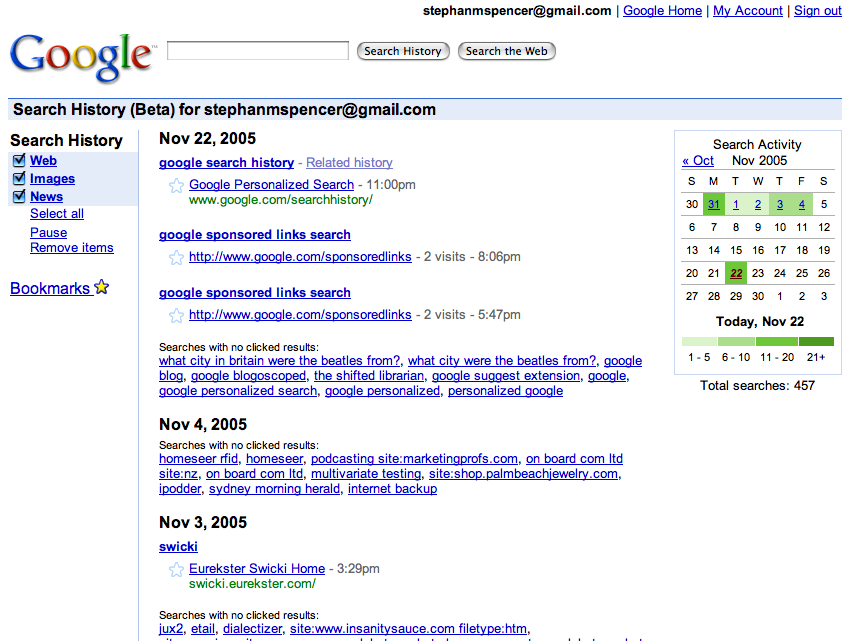
Wouldn’t it be cool if your search engine got smarter the more you used it? That is what Google Search History hopes to achieve. By analyzing your past searches, it hopes to give more targeted and relevant results to you in the future. You can use this on multiple PCs. All you have to do is just be logged into your Google account on your computer, and it will track your past searches, show you what your searches were so you can conduct them again, and also show you what you clicked on in the past. Sign up at https://www.google.com/searchhistory. Google Personalized Search Google Personalized has been overhauled and replaced with Google Personalized Search. Get personalized search results using Google Personalized Search at https://www.google.com/psearch. With it, your search results are ordered based on what you’ve searched for in the past. You can also browse and search over your past searches, including the web pages, images, and news headlines you’ve clicked on.
Google Suggest
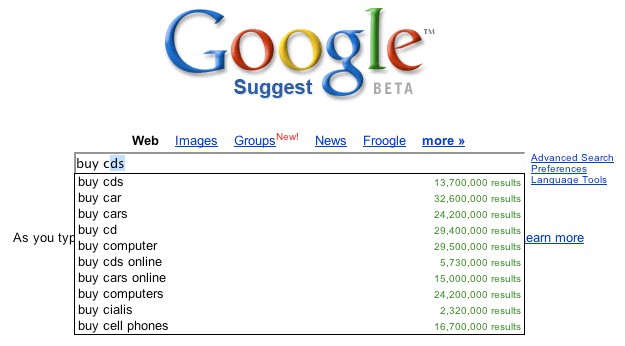
Google Suggest, available at https://google.com/webhp?complete=1, is a clever enhancement to Google’s search box. It very effectively second-guesses what you are searching for before you finish typing in your search phrase and fills in the rest of the search term for you. In other words, just start typing and, with each keystroke, Google starts suggesting search keywords.
For example, if you type “buy c” Google Suggest lists search terms in what appears to be in order of search popularity, such as buy cds, buy car, buy cars, buy cd, buy computer, etc. Along with each suggested search term, Google Suggest displays the number of results for that term. A very elegantly built tool that works fast and seamlessly. Google Suggest functionality is also available via a toolbar extension for the Firefox Web browser, available for download from https://toolbar.google.com/firefox/extensions/suggest.
Google Blog Search
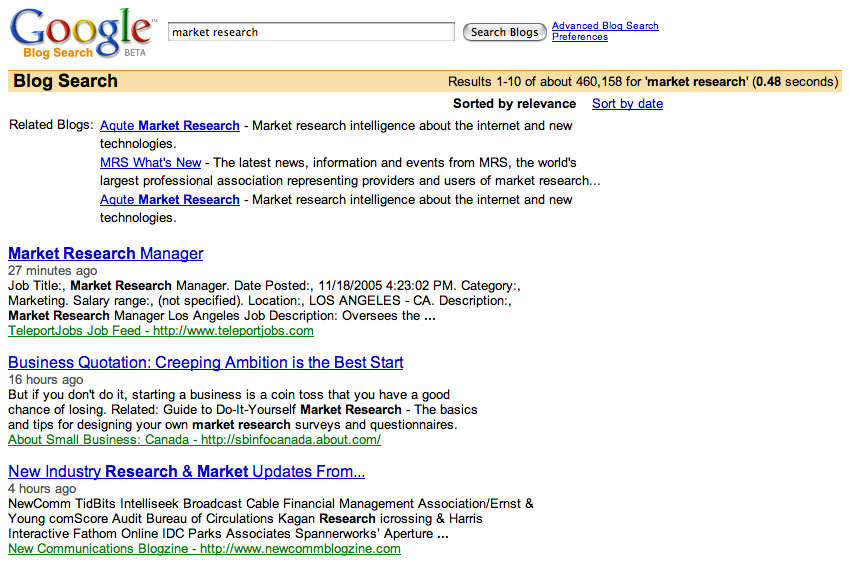
After giving small upstarts like Technorati, Feedster, and PubSub lots of time to build RSS specific search engines, Google finally decided to enter the fray with its own offering: Google Blog Search. It’s available at https://blogsearch.google.com. It’s actually misnamed, since it is a search engine of RSS feeds rather than blogs. More specifically, blogs without RSS feeds won’t make it into Google Blog Search, yet sites that aren’t blogs but have RSS feeds are included. It’s not known exactly how Google Blog Search discovers all the RSS feeds it has indexed in Google Blog Search, but at this time you cannot submit your RSS feed to be included. With the advanced search functionality in Google Blog Search, you can search by author, by date range, and by blog.
Google Personalized Homepage
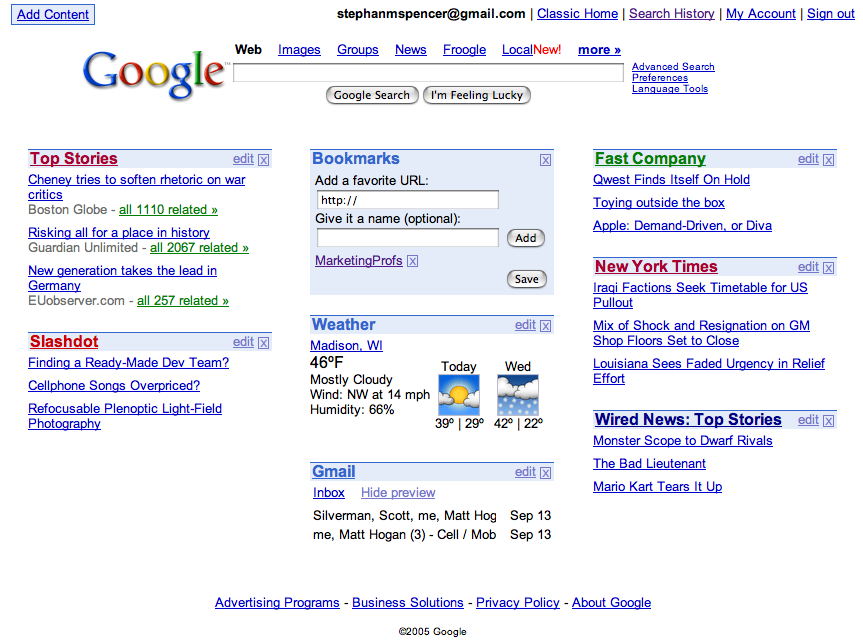
Customize Google’s home page with your city’s weather, your favorite team’s scores, latest messages from your Gmail inbox, past search history, saved bookmarks, late-breaking headlines across numerous news sources and RSS feeds, and more. Available at https://www.google.com/ig.
Google Reader
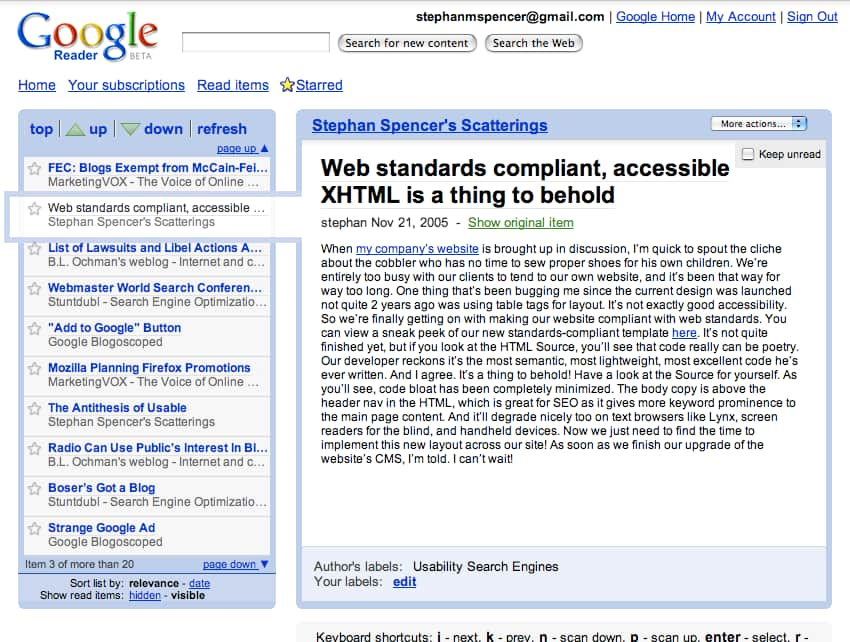
RSS feeds have revolutionized the way that we consume late-breaking news and blog content. Google has been slow to enter the web-based RSS aggregator arena, but it has finally come out with Google Reader, available at https://reader.google.com, to compete with services such as My Yahoo, MyMSN, and Bloglines.
This tool is still a bit clunky, but there are some very elegant attributes to it. It’s well worth checking out, particularly if you prefer subscribing to RSS feeds through a Web site, rather than an installed application on your PC.
Google Q&A
This isn’t actually a separate service; it’s built right into the Google search interface. Sometimes when you submit a query to Google, instead of returning the standard sort of search results Google may provide you with a direct answer to your question, but also citing (and linking to) the source that it obtained the answer from.
For example, either the query when was Einstein born? or an equivalent query of Einstein birthday will return the date of his birth rather than a set of search results. Here are some more example queries that return Google Q&A results: population of USA, President of France, what is the birthplace of Bono?, when was Star Wars released?, who is the Prime Minister of England?, moon size, who shot Abraham Lincoln?, Pamela Anderson’s measurements, and height of Kilimanjaro.
Google SMS
On the go with just a SMS-capable cell phone in your pocket? No problem! Just conduct your search from your cell phone by sending Google your query as a SMS text message to the US shortcode 46645 (GOOGL on most phones). You’ll then receive one or more text messages back with your results, usually within a minute. Results may be labeled as “1/3”, “2/3”, and so on. To get Google SMS help info sent directly to your phone, send the word “help” as a text message to 46645. Or learn more at https://sms.google.com
Google Web Accelerator
Ever feel like Web pages just seem to crawl, even though you have a high-speed Internet connection? Google’s response is a software application called Google Web Accelerator; you install it on your PC and it makes Web pages load faster. It relies on Google’s network of proxy servers that download and cache frequently requested Web pages so that they are instantly available.
Google Web Accelerator also helps with Web browsing by pre-fetching certain pages on to your computer in advance, by compressing the data before sending it to you, and by downloading only the updated part of a page if a web page has changed since you last viewed it. A free download from https://webaccelerator.google.com.
Next week in the final part, we’ll examine many more cool Google services and tools.

Chapter 6:
Keyword Research
From the fundamentals of link building to the nuances of natural linking patterns, virality, and authority.
Related Posts

Embrace Journaling, Tackle Tardiness, and Explore Our Energetic Echo
Here’s what I found inspirational, challenging, or just downright hilarious this week. What caught your eye? And, remember to check out this week’s great podcast episodes: Scaling a SaaS Company with Jason Morehouse “A crucial factor to business success is to find and take the personal path that works best for you.” — Jason Morehouse […]
Read More
Harrison’s harmony, conquering a blank canvas, & gut health hacks
Here’s what I found inspirational, challenging, or just downright hilarious this week. What caught your eye? And, remember to check out this week’s great podcast episodes: Be a Sales Game Changer with Fred Diamond “True elite sales professionals develop a dedicated mindset, proactive client interaction, and continuous self-preparation. They understand their client’s needs and enable […]
Read More
Rebirth of sleeper trains, 4,000 weeks is a long/short time, and golden age for medicine
Here’s what I found inspirational, challenging, or just downright hilarious this week. What caught your eye? And, remember to check out this week’s great podcast episodes: A Story Worth Retelling with Luke Storey “Aligned values are the cornerstone of successful partnerships, whether in business or life, as they shape our moral code, define our priorities, […]
Read More
